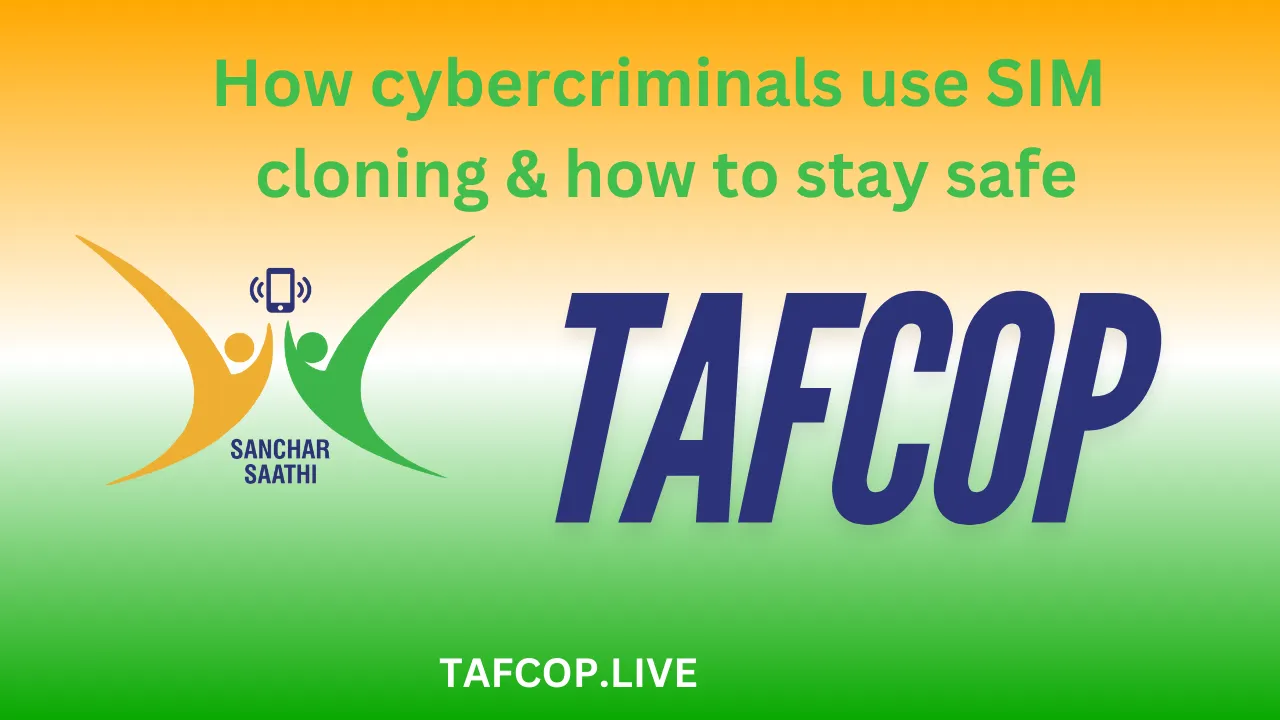Imagine waking up one morning to find your bank account emptied, your social media accounts hacked, and your phone number no longer under your control. Sounds like a nightmare, right? Unfortunately, this is the reality for thousands of people who fall victim to SIM cloning, a sophisticated cybercrime that’s on the rise in India. Cybercriminals are using this technique to steal personal information, drain bank accounts, and even impersonate victims. But don’t worry—understanding how SIM cloning works and taking a few simple steps can help you stay safe.
So, how do cybercriminals use SIM cloning, and how can you protect yourself? In short, SIM cloning involves creating a duplicate of your SIM card, allowing criminals to intercept calls, texts, and even two-factor authentication codes. To stay safe, avoid sharing personal information online, enable additional security features like PINs for your SIM, and monitor your accounts for unusual activity.
How cybercriminals use SIM cloning & how to stay safe
Cybercriminals use SIM cloning to duplicate your SIM card, gaining access to calls, texts, and two-factor authentication codes. To stay safe, avoid sharing personal information, enable SIM PINs, and monitor your accounts for suspicious activity.
What Is SIM Cloning?
SIM cloning is a sneaky technique where cybercriminals create an exact copy of your SIM card. Once they have this duplicate, they can use it to make calls, send texts, and even access your online accounts. It’s like giving a thief the keys to your digital life.
How does SIM cloning work? First, criminals gather your SIM card’s unique identification number (ICCID) and other details. They can do this through phishing scams, malware, or even by bribing telecom employees. Once they have this information, they can program a blank SIM card to mimic yours. After that, they’re in control—your phone stops working, and they start receiving your calls and texts.
Why Is SIM Cloning Dangerous?
SIM cloning is dangerous because it gives cybercriminals access to everything tied to your phone number. This includes:
- Bank accounts: Many banks use SMS-based two-factor authentication (2FA). If criminals intercept these codes, they can easily drain your account.
- Social media accounts: They can reset passwords and take over your profiles.
- Personal data: They can read your messages, access your contacts, and even impersonate you.
For example, in 2021, a Mumbai-based businessman lost ₹1.2 crore after cybercriminals cloned his SIM and intercepted OTPs (one-time passwords) to authorize fraudulent transactions.
How Do Cybercriminals Clone a SIM Card?
How do cybercriminals clone a SIM card? It’s not as complicated as you might think. Here’s a step-by-step breakdown:
- Gather information: They collect your SIM card’s ICCID and other details through phishing, malware, or insider help.
- Create a duplicate: Using specialized software, they program a blank SIM card with your information.
- Activate the clone: They insert the cloned SIM into another phone, and voila—they’re in control.
For instance, a common tactic is sending fake SMS links pretending to be from your telecom provider. If you click the link and enter your details, they’ve got what they need.
How Can You Tell If Your SIM Has Been Cloned?
How can you tell if your SIM has been cloned? Here are some warning signs:
- Your phone suddenly loses service: If your phone stops working for no reason, it could mean someone has cloned your SIM.
- Unusual activity: Check for calls or texts you didn’t make, or notifications about password changes.
- Failed login attempts: If you receive alerts about failed login attempts, it could be a sign someone is trying to access your accounts.
If you notice any of these signs, contact your telecom provider immediately.
How to Protect Yourself from SIM Cloning
How can you protect yourself from SIM cloning? Here are some practical steps:
- Enable a SIM PIN: This adds an extra layer of security. Even if someone clones your SIM, they’ll need the PIN to use it.
- Avoid sharing personal information: Be cautious about what you share online, especially on social media.
- Monitor your accounts: Regularly check your bank and social media accounts for unusual activity.
- Use app-based 2FA: Instead of SMS-based 2FA, use apps like Google Authenticator for added security.
For example, a Delhi-based IT professional avoided SIM cloning by using a SIM PIN and app-based 2FA. When criminals tried to clone his SIM, they couldn’t bypass these security measures.
What Should You Do If Your SIM Is Cloned?
What should you do if your SIM is cloned? Act quickly:
- Contact your telecom provider: Report the issue and ask them to deactivate the cloned SIM.
- Change your passwords: Update passwords for all your important accounts.
- Notify your bank: Inform your bank about the situation to prevent unauthorized transactions.
- File a police complaint: In India, you can file a complaint with the Cyber Crime Cell.
FAQs About SIM Cloning
Can SIM cloning happen to anyone?
Yes, anyone with a SIM card is at risk, but taking precautions like enabling a SIM PIN can reduce the chances.
Is SIM cloning common in India?
Unfortunately, yes. With the rise of digital banking and online services, SIM cloning has become a popular tactic among cybercriminals in India.
Can I recover my money if I’m a victim of SIM cloning?
It depends on how quickly you act. If you report the issue immediately, there’s a chance your bank can reverse unauthorized transactions.
Conclusion
SIM cloning is a serious threat, but it’s not unbeatable. By understanding how it works and taking proactive steps like enabling a SIM PIN and monitoring your accounts, you can protect yourself from falling victim to this cybercrime. Remember, staying informed and vigilant is your best defense. So, take action today—your digital safety is worth it.
“The only way to stay safe in the digital world is to stay one step ahead of the criminals.” – Mazhar
Steps to Protect Yourself from SIM Cloning
| Step | Action |
|---|---|
| 1 | Enable a SIM PIN |
| 2 | Avoid sharing personal information |
| 3 | Monitor your accounts regularly |
| 4 | Use app-based 2FA instead of SMS-based 2FA |
| 5 | Report suspicious activity immediately |
By following these steps, you can significantly reduce the risk of SIM cloning and keep your personal information safe.

